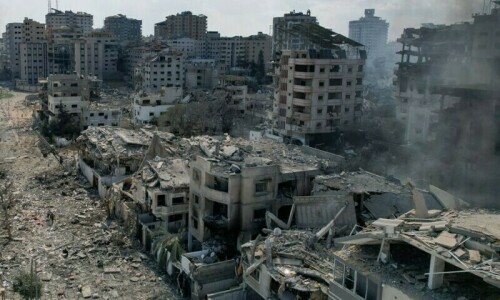The merchants of hate may in some respects have been muzzled, but they continue to thrive in the echo chamber that is the social media.
An in-depth investigation by this paper has uncovered the extent to which banned organisations — including Sunni and Shia sectarian groups, global terrorism outfits operating in Pakistan, as well as Sindhi and Baloch separatists — and their supporters, maintain interconnected and public networks on Facebook.
Out of 64 organisations banned by the government, 41 have a presence on the platform, disseminating their ideologies through more than 700 pages and groups, aside from individual user profiles. In terms of size, the Ahle Sunnat Wal Jamaat with 200 pages and groups is by far the largest, and that is not counting the 148 that belong or indicate allegiance to the Sipah-i-Sahaba Pakistan, an earlier iteration of the ASWJ which was banned in 2002.
These findings, particularly when seen in the context of recent developments in Pakistan, are disturbing evidence of the confusion that prevails in the state apparatus about what constitutes the real threat to this country. Given the scale of religious violence that has eviscerated Pakistani society in the past decades, such a lack of clarity is astounding.
Witness how official authorities are hounding individuals for expressing views on social media that are critical of the establishment, and how they have demonised those professing ‘secular’ opinions on such platforms. How many such individuals or progressive civil society groups have stoked hatred against other communities, murdered people on allegations of blasphemy, or pitted Pakistani against Pakistani along the lines of faith?
The state’s pursuit of red herrings and its muddled priorities leave it unable to construct a focused and consistent counter narrative that is so desperately needed to consolidate the gains made in kinetic operations. NAP was clear in its objective: there is to be no compromise on religious extremism in all its forms.
Granted, Facebook itself has admitted to the difficulty in removing offensive material from its network, but the government should be more proactive with the company on this score. The fact that the Parliamentary Committee on National Security yesterday asked for a briefing on the activities of banned groups on Facebook inspires hope that this issue may be addressed with the attention it deserves.
Aside from implementing the ban in its entirety, the state must ensure that the leaders of these groups are placed under the restrictive Fourth Schedule and their actions closely monitored. Furthermore, the rationale behind banning these 64 organisations should be explained to the people. For instance, some of these groups are not directly involved in violence, but they do advocate the overthrow of the democratic system.
The public must be trusted to understand what constitutes extremism and the seemingly innocuous paths that can lead to it.
Published in Dawn, May 31st, 2017












































